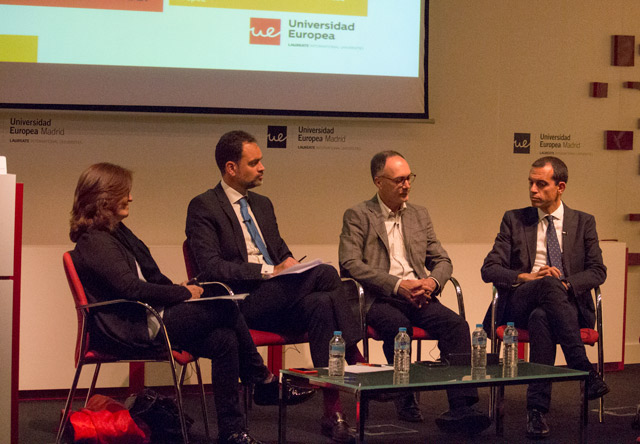
La comunicación corporativa ha sufrido una enorme transformación desde que a mediados de los años 90 –;y, especially, from 2000- Internet contribute to making the economy overall and communication. Internet radically changed the communication model in force since decades ago, a model in which the mass media had the prerogative to spread only that they considered relevant.
By then, traditional media leaked information and acted as "gatekeepers”, He defined as the Kurt Lewin 1943. In that model, the role of business was reduced largely to try to pass this filter so that their messages reach their audiences, either via advertising or generating news meriting be disseminated (publicity). The citizens, por su parte, eran –éramos–; taxpayers in the communication process with a capacity of feedback limited to situations that now seem almost anecdotal, as letters to the editor or call the radio. Little more.
Sin embargo, Internet radically changed that model. Así, we have gone from a model of "mass communication" to a model of "mass communicators". This is, It has formed a new paradigm in which the preponderant role of traditional media disappears and in which all traditional -Means, new media, companies and citizens have the necessary technology (bandwidth and content management) to spread our messages. A new paradigm in which the classical figures "issuer", "Filter" and "receptor" are transformed and in which all agents are the same model issuing and receivers of information on almost equal terms.
This has led to phenomena such as consumer empowerment, network communication or content viralización, great impact on the business world, although I will not belabor this post on them.
I prefer to focus this time on another couple of issues arising from the data explosion that generated Internet and the need for communication departments to incorporate professionals who contribute to face this reality -a problem or opportunity, depending how you look. I mean, to the Big Data and automated communication from the use of algorithms.
El Big Data
Reader who wants to know more deeply the impact of digitization companies can consult the results of 2016 European Communications Monitor (ECM), European survey of communication professionals that promotes CDAD and that in Spain is carried out with the collaboration of Dircom.
Here, suffice it to note that although digitization is a phenomenon that most professionals identified as key, Few departments have adopted strategies to adapt. A good example of this is the Big Data[1]: although many professionals emphasize its relevance, very few have adopted data analytics tools and big data in their departments. Así, according ECM, although 75% of respondents believe that the Big Data You will change their work, only 20% used techniques Big Data in their organizations (and those who have done work primarily in listed companies and agencies, while government and NGOs are lagging).
This, no obstante, It looks like it's going to be changing by leaps and bounds. The "data" today is the raw material of the new economy and communication. La digitalización y el análisis de datos va a cambiar –está cambiando ya–; the work of those who are in the knowledge society as automation changed the factory work.
It seems clear, por tanto, already today and, especially, Looking to the near future, It will require further training and development skills analytical, for both new generations of communicators who aspire to join the profession and those who are -we-active and do not want to be outdone. En la actualidad, However, and except honorable exceptions there is some mismatch between the training offered at university level and what the market needs.
Algorithms and automated communication
The same goes for algorithms[2] They are using search engines and social platforms and determine, por ejemplo, the place and position our content displayed. Or those used in corporate websites to provide information quickly and effectively to customers and consumers surfing the web and raise questions or interact with a virtual agent.
A majority of communication professionals agree on the importance of algorithms, but only a third of respondents to ECM in 2016 confirmed that their departments were taken into account when developing their algorithms such messages and content. Algo sorprendente –se indica en el estudio–; because the use of techniques Search Engine Optimization (SEO) or creating content keeping in mind the algorithms of search engines is not so new.
Algorithms are increasingly dynamic; es decir, They adapt to situations and increasingly more efficiently, so and points to a future of business communication will be automated, giving rise to a new discipline that has already been dubbed "public relations or automated communication" or "self-communication".
Both trends-the increasing use of techniques Big Data y algoritmia–; They are interrelated. And the fact that they are upward trends seem to suggest that increasingly there will be more "self-communication", so many of the new jobs in the sector will emerge around this.
New professional profiles
If you ask me for the new professional profiles which have emerged or will emerge from here a few years time, habría que destacar –en función de lo que os comentaba arriba–; related data analysis, but also others such as those related to the generation of quality audiovisual content. Ejemplo de ello serían los infografistas –individuos capaces de sintetizar gráficamente y de modo comprensible la información –;, or of creators and video editors, increasingly necessary to supplement communication networks and social media.
No obstante, we must not forget that the developments that have suffered business communication we must distinguish between strategic issues and operational or tactical. And if we look at the changes that have occurred in both planes Internet, we can see how the impact has been tremendous.
Así, it seems obvious that the way campaigns are run, thanks to the variety of channels and digital tools now available, little resemblance to the way it was done a couple of decades. But still important these operational changes, the fundamental change has occurred at the strategic level.
In this regard, we can say that the planning model is still valid according to which any plan or communication campaign should start from an analysis of the problem, have clear objectives and strategy, Addressing some public or stakeholders certain, through a series of messages, according to a schedule and the allocated budget. Es decir, the pillars on which corporate communication is based are still those who were. Ahora bien, If analizásemos one by one all those elements of the planning model we would see how there have been very significant changes that affect how such planning should be done and, with that, how new skills are needed in communication managers.
Make such deep dissection require greater extent than I intend to devote to this post, so I will refer to a later post I will post about it.
In line with this, otro de los aspectos tratados en la mesa redonda –;and I remember raised @SebasCebrian- it has to do with the breadth and variety of opportunities corporate communication. Every professional must find its place, well as director of equipment or in the field of implementation of various plans and campaigns. Accordingly, personal skills that must have each person vary. Por ejemplo, to succeed in management would be an advantage to have good analytical skills and training in areas such as planning, team leadership, evaluation of strategies or defining budgets. Por el contrario, those who possess creative skills and taste for organizing complex tasks, possibly find a better career path in positions of operational nature.
In any case, what seems common to all professionals in the future is that it must have good skills in areas such as teamwork and remote, particularly important in this global world, in which it is increasingly frequent networking with multidisciplinary teams geographically dispersed; the resilience (or adaptability to change), so that the professional can adapt to circumstances few throws at rapid organizational changes that often occur in most companies; the ability to empathize with other cultures (again, the globalization factor); interest in training (so that knowledge and skills are valid and useful for the company they work or our own business); y, Finally, un excelente dominio de varios idiomas –particularmente el inglés–;.
The importance of English
effectively. During the round table, all participants agreed on the importance of mastering several languages and, especially, English. We are in a global world, where economic borders have been diluted and mastering other languages essential for any professional who wants a moderately successful career.
On the other hand, in a global world, More and more companies focus on certain professional resources hubs international or Global Service Centers, from which services are provided to various local markets. This is a movement that is evident in the field of marketing and, although less relevant, It is also happening in the field of communication. Speak English, Thus, It is a competitive advantage to work in these service centers, They are located in Spain or not.
En definitiva, we can conclude that we are undergoing a period of major changes in the economic and business world, resulting from the impact of new technologies and we can not ignore. Hence continuing training in these new tools -in their understanding and utilization-is configured as a fundamental, both for those who want to join the workforce in this area, como para los que –;ya en la práctica de la profesión–; They want to stay competitive.
And today more than ever valid sentence of Indian philosopher Jiddu Krishnamurti, who in 1895 and said "Education never ends. It's not about reading a book, take an exam and finish your education. Lifetime, from the moment you're born to the moment you die, It is a learning process”.
###
[1] Big Data: Recopilación y análisis de grandes volúmenes de datos –a partir de información estructurada y no estructurada–; to make better decisions and develop better services [in the case of communication, to make better strategic and tactical decisions to reach our public, adapt the message, generate appropriate content to each etc.].
[2] Algorithm: Set of rules which define precisely a sequence of operations and detailing the desired result from the data to be initially.



And in relation to the recommendations to prepare for the near future in the study of BigData, where or what, training center would be at the height of these new educational demands, according to your criteria???
Hi @Yrane, no sé desde dónde me escribes…; There are numerous Spanish universities (public and private) offering quality courses in this matter. Check out, por ejemplo, to this master's degree from the European University https://universidadeuropea.es/business-tech-school/titulacion/master-big-data-analytics
I studied the Master in Political and Business Communication at the Camilo José Cela University and the truth is I do not regret. I recommend him since he even now has a double degree with the title of Expert in Digital Communication. https://master-comunicacion.es/